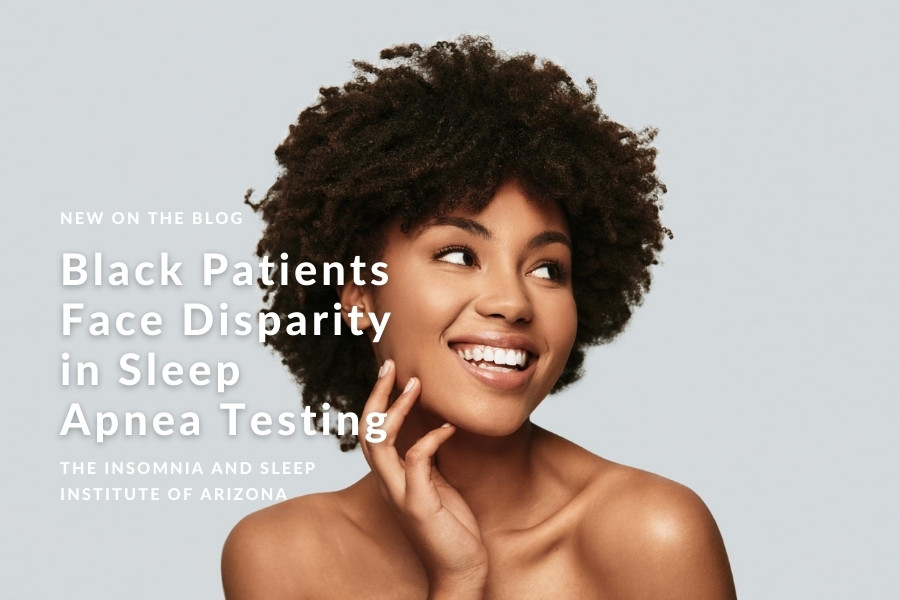Obstructive sleep apnea (OSA) is the most common type of sleep apnea, affecting millions of adults around the world. It is also one of the most common reasons patients schedule a consultation with a sleep expert at The Insomnia and Sleep Institute of Arizona. We are proud to be the face of sleep medicine, and consultations are exclusively with sleep specialists who diagnose disorders—which typically begins with testing in the case of suspected sleep apnea. The standard test for sleep apnea is an overnight sleep study and the first-line treatment for OSA is CPAP therapy. However, according to a recent study, not all OSA tests are equal.
A presentation at the ATS International Conference revealed that Black patients in intensive care units (ICUs) during the pandemic who were tested via pulse oximeters yielded results that were not as accurate compared to their white counterparts. One of the authors says, “While skin pigmentation seems to affect the results of oximetry, we did not know whether the same would be true during tests for OSA. We hypothesized that this would be the case.” During an OSA test, breathing pauses are identified via a decrease in oxygen levels.
OSA Equity
The results of 1,955 patients of various races who underwent overnight sleep studies (in their home rather than a sleep lab) were analyzed. This test was part of the Multi-Ethnic Study of Atherosclerosis Exam. The research team compared shifts in oxygen levels after every breathing pause using different tools including oximeters. When compared to white patients, Black patients had less decrease in oxygen saturation after each pause. The team accounted for other factors that might play a role such as smoking status, BMI, age, and sex. The team says,
Our findings suggest that these measurement problems may lead to underestimation of the severity of OSA in Black individuals. However, whether this underestimation of oxygen drops should lead to important differences in diagnosing and managing OSA in Black and other individuals with dark skin is unclear.
Even though findings remain “unclear,” the lead author urges, “These findings highlight the need to rigorously test the accuracy of oximeters across diverse populations and also to consider whether factors other than the oximeter’s characteristics could explain differences in oxygen patterns with breathing pauses.”
OSA and You
It is estimated that, on a global scale, nearly one billion people might have OSA. Many of them do not know it. Home tests are available, but they are usually not nearly as accurate as a lab test. OSA can range in severity, but even mild OSA is associated with a variety of increased risks of conditions and diseases including obesity, heart conditions, stroke, and diabetes. Living with unmanaged OSA leads to a shortened life span. One of the most common signs of OSA is snoring or waking up gasping for breath. However, many people do not know that they snore and do not remember waking up being unable to breathe the next day. One of the most typical scenarios is that a bedmate tells their partner about these episodes.
OSA occurs when the airway “collapses” during sleep. Obesity, and specifically carrying excess weight in the neck, can be a cause of OSA—in which case weight loss can help and even “cure” OSA. However, OSA can be found even in fit and slender patients. There is also CSA, which is a type of sleep apnea that occurs when the brain isn’t properly communicating with the body when it comes to breathing during sleep. CPAP is the gold standard in treatment, but in the rare case that it is not effective, some patients might be good candidates for the Inspire implant. This implant is placed in the chest and forces the passageway to stay open while asleep. The Insomnia and Sleep Institute is one of the few clinics in the region that works with local surgeons for the placement of Inspire implants.
If you suspect you have OSA, schedule a consultation today. Even if you have tried a home test before or another sleep lab study, results may change. OSA can drastically affect quality of life, health, and lifespan. Contact The Insomnia and Sleep Institute today by calling the clinic or completing the online contact form.





